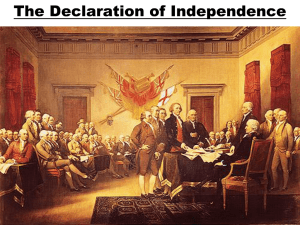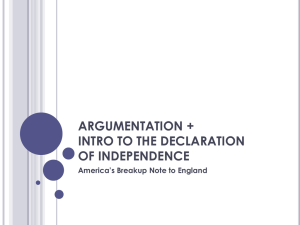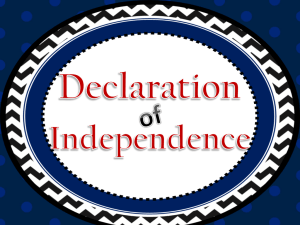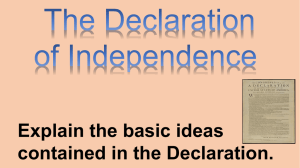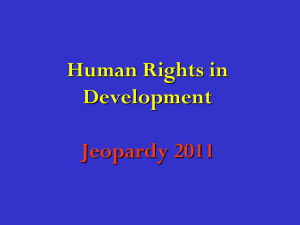the declaration of independence
advertisement
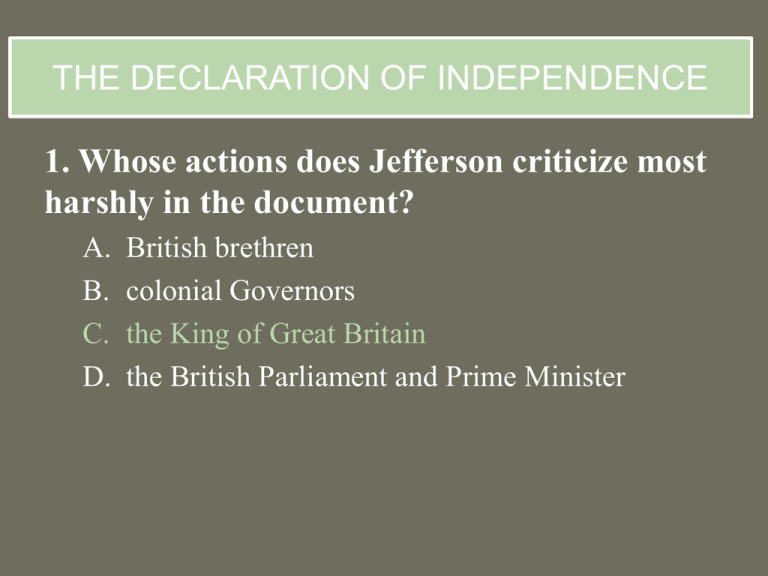
THE DECLARATION OF INDEPENDENCE 1. Whose actions does Jefferson criticize most harshly in the document? A. B. C. D. British brethren colonial Governors the King of Great Britain the British Parliament and Prime Minister THE DECLARATION OF INDEPENDENCE 2. Jefferson believed that governments derive their powers from A. the course of human events. B. the consent of the governed. C. their Creator. D. the laws of nature. THE DECLARATION OF INDEPENDENCE 3. What was Jefferson’s opinion about changing long-established governments? A. People should first encourage government leaders to resign from office. B. Governments should change whenever people disagree with a policy. C. Governments should continue unless they cause insufferable problems. D. Long-established governments must always change short-term policies. THE DECLARATION OF INDEPENDENCE 4. What rhetorical feature does Jefferson employ when he begins several consecutive sentences with the words “He has”? A. B. C. D. Parallelism Rhythm structuralism activism THE DECLARATION OF INDEPENDENCE 5. A primary assertion of the document states that: A. people have a right to overthrow governments that deny their basic rights. B. any king who addresses important issues and grievances is a tyrant. C. it is necessary to list all reasons for dissolving political connections. D. Great Britain is, and ought to be, totally abolished. THE DECLARATION OF INDEPENDENCE 6. The Declaration’s list of grievances states that the king has A. denied the colonists permission to build and maintain their own navy. B. dissolved the standing army necessary for the colonists’ protection. C. refused to pass laws that are for the good of the people. D. raised the prices of services necessary for the colonies’ well-being. THE DECLARATION OF INDEPENDENCE 7. According to Jefferson, what has been the king’s reaction to the colonists’ petitions? A. B. C. D. refusing to listen to their pleas sending representatives to resolve the issues promising changes but failing to act inflicting further harm on them THE DECLARATION OF INDEPENDENCE 8. Jefferson’s “reliance on the protection of Divine Providence” indicates a belief that: A. B. C. D. their course of action is morally correct. they will easily defeat the British forces. God will punish the king for his unjust actions. God has bestowed “sacred honor” upon the Declaration’s signers. THE DECLARATION OF INDEPENDENCE 9. What does abdicate mean? A. B. C. D. give up responsibility for provide order for support the importance of accept the demands of THE DECLARATION OF INDEPENDENCE 10. The word affected means A. convulsed. B. absolved. C. unwarranted. D. influenced. THE DECLARATION OF INDEPENDENCE 11. What is Jefferson’s complaint about taxes? • Jefferson complains that taxes have been imposed on the colonists without the people’s consent (line 74). They result from “pretended legislation” enacted by “a jurisdiction foreign to” the colonial constitutions (lines 67–69). THE DECLARATION OF INDEPENDENCE 12. What concerns have the colonists expressed to their “British brethren”? • According to lines 107–118, they warned the British to avoid attempting to extend “unwarrantable jurisdiction” over the colonies and reminded them of the reasons for the colonists’ emigration and settlement in the colonies. They also appealed to the British people’s sense of justice and generosity in asking them to “disavow” their government’s tyrannical acts. THE DECLARATION OF INDEPENDENCE 13. In an argument, a claim is an author’s position on an issue. What claim does Jefferson make in the 1st paragraph, and how does he say he will support that claim? • Jefferson claims that sometimes rejecting a government is justified. He supports his claim in the specific context of the American colonies by showing that Great Britain’s government in the colonies is bad. THE DECLARATION OF INDEPENDENCE 14. Infer: What overall reason for the colonies to separate from Britain does Jefferson outline in the second paragraph (lines 8-31) • He reasons that governments that do not honor citizens’ rights should be overthrown; the King’s actions and decisions yielded such a government. THE DECLARATION OF INDEPENDENCE 15. Cite Evidence: How do the syntax and rhetorical features that Jefferson uses in the 1st sentence of the 2nd paragraph (lines 8-10) contribute to the persuasiveness of the document? • Tone is elevated in the opening words—the organization of the words“ We hold these truths to be self-evident” sounds nobler than saying “We believe this.” The parallelism of stating each right in a dependent clause beginning with “that” adds power and rhythm to the ideas. THE DECLARATION OF INDEPENDENCE 16. Draw Conclusions: What theme about government does Jefferson communicate in the 2nd paragraph? • Established governments should not be changed impulsively; however, getting rid of a bad government is not only justified, it is a duty. THE DECLARATION OF INDEPENDENCE 17. Identify the most striking words that Jefferson chooses to describe the king’s actions in lines 22-31. How does this language support his claim? • “abuses,” “usurpations,” and “despotism” stress the King’s unjust government THE DECLARATION OF INDEPENDENCE 18. How do the rhetorical features in the conclusion (lines 119-133) contribute to the power and persuasiveness of the document? • The repetition of the word “all” emphasizes that the break with Britain will be complete and absolute. The parallelism of dependent clauses beginning with “that” connects this section to the inspirational section about rights in lines 8–13, which also begins a series of clauses with “that” and punctuates each declaration. The inspirational connection and rhythm enhance the persuasiveness and power of the conclusion. The parallelism in the final line: “our lives, our fortunes, and our sacred honor” brings the pledge, and the document, to a powerful, poetic, and memorable close.

